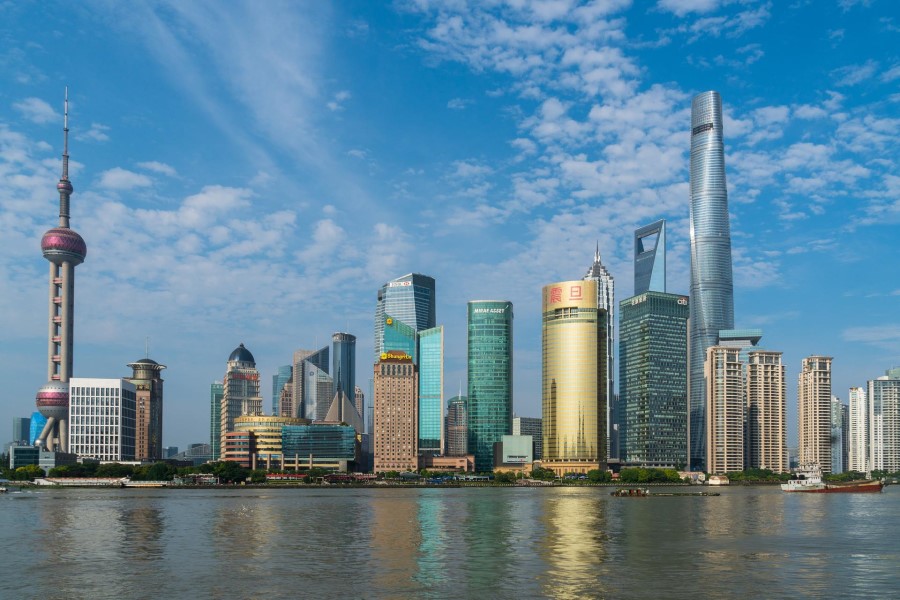
Shanghai
Many Covid-19 related curbs in Shanghai will be lifted from today (1 June), following two months of lockdown, severely affecting businesses and residents.
The effects have been felt overseas. Last month, the Port of Oakland noted a seventeen percent drop in container volume in April compared to the previous year.
Much of this decline is due to shutdowns across China, and particularly in Shanghai, the world’s busiest port.
Bryan Brandes, maritime director at the Port of Oakland, said: “US exports have been hampered by vessel schedules thrown into disarray in China.
“Most of Oakland’s business depends on the Asia-US trade route.”
However, Mr Brandes noted that by mid-May arrivals from Shanghai had ticked up, as some manufacturing and transportation activity increased ahead of today’s reopening.
Most businesses will be allowed to reopen in China’s most populous and richest city. Some restrictions on residents will remain, such as needing a negative PCR test before using public transport.
Restaurants will remain closed and shops will open with capacity restrictions.
The shutdowns in Shanghai and elsewhere have taken a toll on China’s GDP growth.
ING estimates that a month of shutdown in Shanghai leads to a six percent drop in GDP for the city, with knock-on effects causing a two percent drop in GDP for the whole of China.
Meanwhile, Goldman Sachs has revised down estimates of the Chinese Q2 quarter on quarter GDP growth to minus 7.5 percent annualised.
Speaking in May 2022, Tedros Adhanom Ghebreyesus, chief of the World Health Organisation (WHO), doubted that the zero Covid-19 policy was maintainable, given what is known about the behaviour of the virus.
“We have discussed this issue with Chinese experts and we indicated that the approach will not be sustainable. Transiting into another strategy will be very important.”
Alongside the economic costs of the zero Covid-19 policy, Mark Martyrossian, a director and member of the executive committee at Aubrey Capital Management, thinks zero Covid-19 has cost Chinese President Xi some of his political capital.
“Although it seems likely that a third term as president will be awarded at the 20th National Congress of the Chinese Communist Party (CCP) to be held in October, there is dissatisfaction with recent policies on business regulation and Covid which are widely seen as costing the country economic growth.
“It remains to be seen what impact this will have on Xi’s policies both internally and externally.”
Several actions in the last two years have had a chilling effect on investor sentiment toward China.
In September 2021 China banned online tutoring and severely restricted all private tutors, in an attempt to stamp out all for-profit tutoring.
This devasted the well-developed private education sector in the country, with some firms closing and others - such as New Oriental Education and Technology Group - seeing a drop in value of 90 percent or more.
Meanwhile, the crackdown on large technology firms, including Alibaba, Tencent Holdings and Bilibili, which began in the autumn of 2020, has been estimated by economists to have erased $1.5 trillion from China’s economy.
The crackdown has led to repeated fines for technology companies, including a record $2.8 billion fine for Alibaba in April 2021.
In May 2022, China’s vice-premier Liu He pledged support for the technology sector. However, analysts took this to mean there would be no further tightening, rather than there being a reversal in the implemented policies.
Mr Martyrossian commented: “If the [Covid-19] experience proves chastening and causes a reining in of the more assertive approach we have seen over the last couple of years this will go some way to repairing the negative views toward China.”
China has implemented a succession of recent policies aimed at stimulating the economy, such as issuing government bonds, tax cuts and increased infrastructure spending.
These have gone largely unnoticed by investors according to Mr Martyrossian, who sees them as wasted measures in the face of continuing widespread lockdowns.
But if the easing of lockdowns continues, and there are no further anti-business/anti-entrepreneur moves from the CCP, this may prove an important catalyst for both economic growth and an improvement in investor sentiment, he concludes.
Aubrey Capital Management is a specialist global investor, with a focus on high conviction growth strategies, and specialises in global emerging markets. Founded in 2006, it is majority employee-owned and has offices in Edinburgh and London.





